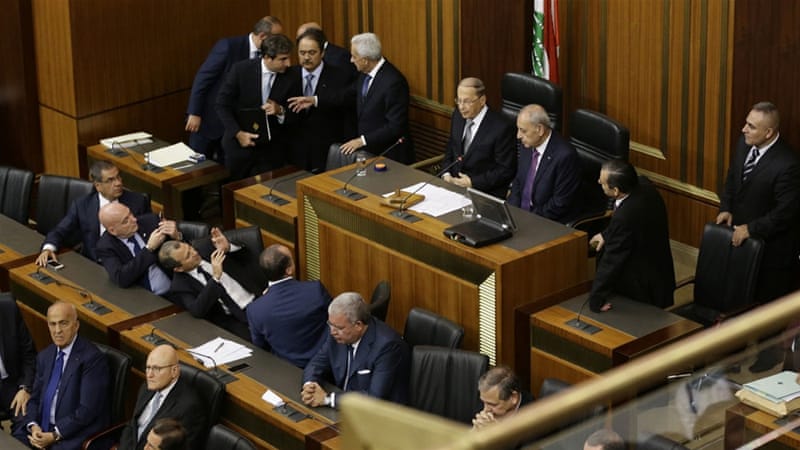
by Al Jazeera – Lebanon’s parliament has ratified a new electoral law, paving the way for the first national elections since 2009. The law passed with a broad majority on Friday after weeks of intensive negotiations between the country’s various parties. The new law preserves the seat allocations in parliament to the country’s various Muslim and Christian sects, despite objections by civil society campaigners. A few members of parliament, including Kataeb Party leader Samy Gemayel, independent politician Boutros Harb and Assem Qanso of the Baath Party, also opposed the move. Some activists rallied outside parliament to denounce the electoral law, which they said fell short of their expectations, according to the website An Nahar. The Associated Press news agency reported that security forces beat a handful of demonstrators who tried to block politicians’ motorcades outside the parliament building. Lebanon’s parliament to vote on reforms On Wednesday, the cabinet approved the new electoral law, which will be based on proportional representation and 15 electoral districts, replacing the winner-takes-all system for the first time in the country’s history. Parliamentary elections are slated to be held in May 2018. The sitting parliament has extended its own term three times since it originally expired in 2013. The dispute among Lebanese political leaders over the new law has threatened to plunge the country into a political crisis and leave it without a parliament for the first time. The current term of the parliament, which has been extended twice since it was elected in 2009, was due to expire on June 20. The law, which introduces a so-called “preferential vote” system, will replace an old, sectarian-based law passed in 1960. In October 2016, Lebanon’s parliament elected President Michel Aoun after a 29-month power vacuum that grew out of bickering between the political factions. Source: News agencies
by naharnet Prime Minister Saad Hariri walked out Friday of a parliamentary session dedicated to discussing and passing the new electoral law after a verbal clash with Kataeb Party chief MP Sami Gemayel. The heated debate erupted after Gemayel accused the government of approving an 11-month extension of parliament’s term in order to have enough time to “offer electoral bribes.” At that point Hariri interrupted Gemayel, insisting that “this is not what the government is doing.” “Do not interrupt me, let me finish my remarks,” Gemayel responded. The exchange prompted Hariri to leave the parliament hall but he eventually returned after Gemayel finished his statement. Speaker Nabih Berri later asked that Gemayel’s remarks be omitted from the session’s minutes of meeting, prompting the young lawmaker to say, “You can delete this phrase but no one can prevent us from saying what we want to say.” The electoral law was later approved by parliament amid the objections of the Kataeb Party, MP Butros Harb, MP Assem Qansou and other lawmakers.
by middleeasteye.net At least seven people were injured in Beirut on Friday as Lebanese security personnel used batons and sticks to break up a demonstration against a new electoral law introduced earlier this week, eyewitnesses reported. Demonstrators had organised in front of the parliamentary building in the Lebanese capital to protest an agreement reached on Tuesday between Lebanon’s rival parties paving the way for an eventual parliamentary election. “We were treated with unprecedented brutality just for trying to defend our basic rights,” Lucien Bourjeily, one of the protest organisers and a Youstink activist told Middle East Eye. The Youstink movement, a civil group originally established to protest Lebanon’s rubbish crisis, has organised many protests since its establishment in 2015. The movement was accused by the government of forming gang riots and causing civil disruption. A video that was circulated over social media showed two women among the protests brutally beaten by soldiers. According to Beirut-based journalist Kareem Chehayeb, the incident was sparked by protesters attempting to enter Najmeh Square, where the Lebanese parliament is based. “All the small streets leading to the square are usually barred by security forces. Whenever there’s a protests, they seal those streets shut,” Chehayeb told MEE. “The protesters wanted to show the opposition to the electoral law by entering Najmeh Square,” said Chehayeb. “Despite not using any violence, security forces beat them up as they tried to walk into the square.” “We were protesting the illegal extension of parliament for a fourth time and the postponing of the elections once again,” “The elections should have happened by now,” added Bourjeily. The agreement reached on Tuesday averted a crisis that had threatened to unravel the political deal that brought president Michel Aoun to office last year, more than two years after the previous president left.



